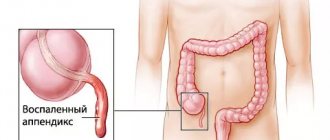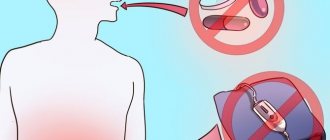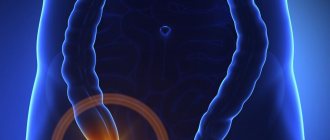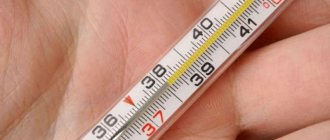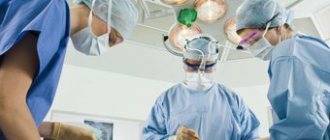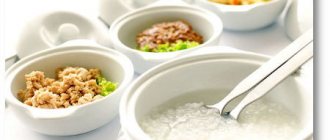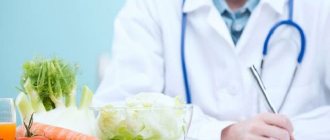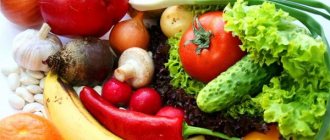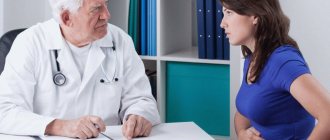When is the diet prescribed?
By following a dietary diet after removal of appendicitis, it is possible to solve several issues simultaneously in the early and late postoperative period. A gentle menu of specially selected products normalizes intestinal function, eliminating stress. Metabolism is restored, regenerative function is activated. Strengthening of the immune system is also noted.
Diet after appendicitis surgery promotes rapid healing of tissue at the incision site. All health care and sanatorium institutions offer a numbered diet system. After appendicitis, the following options are recommended: No. 0b, 0c, 1.
A dietary diet is indicated not only after removal of appendicitis: Therapy of chronic appendicitis is supplemented by recommendations regarding nutrition. The rules are based on the exclusion of salty, fatty and fried foods from the menu. The requirements are identical to diet principle No. 1. Such food reduces the load on the digestive system. Before taking it, the products are crushed. As a supplement, it is allowed to use healing infusions and herbal teas. The menu can also include low-fat meat broths, fresh gifts from the garden.
After appendectomy, laparoscopy, pathologies with purulent or phlegmonous formations, a different table is prescribed on the first day after surgery. To maintain health, an unconscious patient is prescribed glucose. After complex pathologies of appendicitis, the surgical diet lasts 1-2 days. In the future, restrictions will be extended to 7-8 days. After laparoscopy, food requirements are not as strict, since the operation is considered low-traumatic.
Taking into account the patient's condition, 12-16 hours after removal of appendicitis, he may be allowed vegetable broth or jelly. The first day after surgery, diet No. 0b is proposed, which implies limited use of pureed products. All dishes must be liquid. In the period from the second to the fourth day, diet No. 0b is prescribed (boiled vegetables, eggs, rice, herbal tea, decoctions).
Dietary table No. 1 is recommended from 5-6 days. It includes dishes that are easily digested by the gastrointestinal tract. The duration of this diet is approximately 1 month. Provided normal recovery, the patient is allowed to move to table No. 15. This is a general strengthening diet, with a minimal list of restrictions. Healthy products are used predominantly. There is no need to grind them. Among the dishes, liquid food should predominate. The duration of such a diet is determined individually.
Diet after appendectomy
Diet after appendicitis helps maintain tone in the body and normalize the functioning of the gastrointestinal tract. It also reduces the risk of various complications after appendectomy. When following a diet, metabolic processes in the body are corrected, it receives useful vitamins, micro and macro elements. The body's immune system increases, which promotes rapid wound healing and recovery after surgery.
To eat healthy, you should remove unhealthy foods from your diet. These include: semi-finished products, sausages, fast food, canned food, smoked meats, high-fat dairy products, alcohol-containing drinks and lemonades, sweet pastries and products such as cakes or pastries.
You need to stick to the diet for about 60 days. The menu should consist of the following products: light soups prepared with vegetables and herbs, but without fatty meat. You can eat low-fat sea fish, cereals (they are diluted with water), bread, low-fat dairy products, boiled vegetables or steamed foods. For drinks, you should give preference to green tea, compotes, jelly, chamomile or rosehip decoction. Coffee and black tea will have to be excluded.
Diet principles
The postoperative diet plan involves a consistent expansion of the list of permitted products and the method of their processing. The basic principle of such a diet is fractional nutrition. It is suggested to divide meals into 5-7 sittings.
A diet is not only about choosing the right foods, but also about the way they are consumed. You should eat food slowly, chewing each portion thoroughly.
Other rules after surgical nutrition include:
- limited number of products;
- compliance with the drinking regime (purified water, herbal teas, decoctions);
- avoiding eating very cold or hot food;
- There should be a 20-30 minute break between the consumption of main dishes and liquids;
- a single dose of drink does not exceed 200 ml;
- liquids and dishes are sweetened little by little, the use of sugar in the diet is significantly reduced;
- When purchasing food for the table, preference should be given to vegetable and garden crops rich in pectin.
Postoperative nutrition promotes rapid regeneration of damaged tissue. During normal rehabilitation, a faster transition to nutritious nutrition is recommended.
What not to eat after appendectomy
The diet during the rehabilitation period after surgery provides for strict restrictions, especially on the first day. The following products are prohibited:
- seasonings, sauces and ketchups;
- legumes;
- hot peppers;
- mushrooms;
- conservation;
- fast food food;
- fatty fish and meats;
- Exotic fruits;
- food containing chemical dyes;
- confectionery.
Strict restrictions also apply to salt, alcohol, and tobacco smoking.
For those who are prescribed a therapeutic diet after surgery for appendicitis, it is recommended to adhere to additional requirements:
- refuse to perform physical exercises or sports for the duration of rehabilitation;
- wear supportive underwear;
- limit heavy lifting;
- prevent hypothermia of the body.
basic information
First of all, it is worth understanding what exactly happens to a person when a diagnosis of appendicitis is made. The appendix is a small appendix located in the cecum. If severe inflammation occurs, this phenomenon is called appendicitis. Not only adults, but also children face this disease. There are many reasons why appendicitis can develop, so it is important to pay attention to pain symptoms in the peritoneal area and visit doctors in a timely manner.
It is worth paying attention to the fact that today there is no drug treatment for this disease. Therefore, the only possible solution is appendectomy. The inflamed appendage is carefully removed through a small incision. After this, the recovery process goes quite quickly. However, no matter how well a person feels after the procedure, it is very important to adhere to a special diet. You need to be especially careful about food in the first days after appendicitis is removed. It is important to listen to all the doctor’s recommendations and strictly follow them.
What to eat in the first three days after surgery
For 12-24 hours after the surgical procedure to remove appendicitis, all patients are prescribed a zero diet. It is also called surgical. For those under the influence of a medicated coma, nutrition is administered intravenously. For these purposes, glucose is used.
A zero diet involves the use of jelly-like and liquid foods. They should be consumed in doses, dividing the daily intake into 7-9 times the intake.
The surgical diet menu looks something like this:
- first dose – currant jelly (100 ml);
- second dose – rice water (70-100 ml);
- third dose – lightly sweetened tea (not strong);
- fourth meal – vegetable broth (120 ml);
- fifth dose – freshly squeezed juice diluted with water (100 ml);
- sixth method – jelly from fresh fruits/berries (150 ml);
- seventh method – sweetened tea (not strong).
You should not eat sour cream, brown bread, or slices of fruit due to the risk of intestinal bloating due to the fermentation process.
After removal of appendicitis using laparoscopy, a zero diet is not prescribed. This is explained by a pinpoint injury to the intestine, excluding the presence of a large affected area.
Restrictions apply to:
- large cutting of ingredients;
- the use of products that can cause gas formation (cabbage, sweet fruits, brown bread, pastries, legumes, etc.);
- food that irritates the walls of the gastrointestinal tract (chili peppers, large peppercorns, marinades, mushrooms, etc.);
- dairy products (due to the risk of infection).
On the second day after removal of appendicitis, the diet expands. Single servings increase to 150 g or 170 ml. The number of meals is reduced to 5 times a day.
Inclusions allowed:
- liquid porridge (oatmeal, buckwheat, etc.);
- puree soups with homogeneous cereals;
- steamed meat and fish soufflé;
- cream (no more than ½ tsp);
- jelly based on non-acidic berries;
- omelette (without crispy crust).
Foods that you should absolutely not eat after appendicitis surgery
After removal of appendicitis, it is very important to completely exclude fried foods (potato pancakes, omelettes, pancakes, etc.) from the diet of both adults and children, as well as the following foods:
- Salt;
- Spices;
- Black or red pepper;
- Ketchup;
- Sauce;
- Horseradish;
- Mustard;
- Fatty fish (herring, salmon, mackerel);
- Mushrooms;
- Salted fish (herring, dried fish, ram, etc.);
- Lard or fatty meat;
- Tomatoes;
- Mayonnaise;
- Raw onion or garlic;
- Beans, peas and other legumes;
- Any canned food;
- Borsch;
- Fish soup and fish soup;
- Homemade milk;
- Cottage cheese is fatty;
- Cheese;
- Boiled and smoked sausages (including frankfurters);
- Dumplings;
- Sparkling water;
- Fresh bread;
- pasta;
- Coffee;
- Shrimps;
- Rolls;
- Chocolate;
- Candies;
- Jam;
- Various pickles and marinades;
- Pastries, cakes and other confectionery products;
- Ice cream;
- Condensed milk;
- Grape;
- Very sweet fruits (grapes, nectarines);
- Persimmon;
- Pomegranate;
- Watermelon.
Weekly menu for adults by day
The set of products for the dietary table after removal of appendicitis for each day is selected individually. If the first 3 days are characterized by strict restrictions, then from the 4th day the patient is offered an expanded diet. It is allowed to include:
- fermented milk products (low-fat or low-fat);
- fine-grained cottage cheese (natural);
- vegetable puree;
- baked apples;
- poultry, veal or fish in the form of minced meat (only lean tenderloin is allowed from pork).
Dairy products are allowed for each patient in a certain quantity. A doctor may prohibit their consumption if the body reacts to an acidic environment with stool disorders.
With normal recovery of health after surgery for appendicitis, diet No. 1 is proposed. You can diversify the menu with the following dishes:
- pureed cottage cheese with sour cream and honey (fermented milk products are chosen of natural origin and contain a minimum amount of fat);
- white bread croutons (daily allowance up to 50-100 g);
- baked apples with honey;
- puree soups from pumpkin, zucchini, potatoes;
- steamed veal or poultry meatballs;
- fish under a bed of vegetables, baked in the oven;
- rice water (a small amount of cereal is allowed);
- fresh fruit (the peel needs to be peeled).
As an example, the following version of the dietary table for the week is offered.
Nutrition after five days of postoperative nutrition
On the fifth day, you can add fermented milk products to the porridge menu. They are easily digestible and have a positive effect on the stomach. The basis of fermented milk products should be homemade yoghurts with bifidobacteria, low-fat kefir, and cottage cheese (must be unsweetened).
The patient will have bed rest for a long period of time, so the possibility of constipation cannot be ruled out. Some medications also cause a similar problem. To prevent constipation, you should consume as many fiber-rich foods as possible. It is found in the following products:
- Baked apples.
- Rosehip decoction.
- Boiled carrots.
Boiled carrots are one of the allowed foods during the postoperative period
Advice! Before making changes to the postoperative menu, it is recommended to consult with a leading physician in order to avoid complications.
To quickly restore the body and digestive system, beta-carotene is needed. It is found in large quantities in pumpkin. Other useful elements contained in this vegetable can speed up metabolic processes, have a positive effect on blood clotting, and increase the level of absorption of products. During the diet, it is recommended to consume pumpkin in the form of puree soup or, alternatively, in the form of porridge.
Diet by day for appendicitis
DaysBreakfast 1Breakfast 2DinnerAfternoon snackDinnerFirst, purified water, Second, herbal tea, oatmeal, rice broth, rosehip broth, chicken broth (not fatty) Third, boiled egg, fruit jelly, vegetable broth, village tea, Fourth, jelly, berry broth, puree of chicken fillet and zucchini, liquid compote, water-based compote, fifth, omelette, chopped fishermen's tea, vegetable soup, sixth oatmeal pumpkin puree baked apples mashed potatoes, steamed meatballs Seventh rice porridge herbal tea vegetables with steamed chicken boiled eggList of permitted and prohibited products
The diet should include:
- Cereals - buckwheat, oatmeal, rice.
- Vegetables - potatoes, zucchini, pumpkin, carrots.
- Dairy products - skim milk, kefir, cottage cheese, fermented baked milk.
- Meat - chicken, beef, veal.
- Eggs.
You can consume various berry fruit drinks and herbal tea . Fruit juices are acceptable. Apples can only be consumed baked. Other fruits are consumed only as recommended by a doctor.
It is allowed to consume fish in small quantities , but it should be of low-fat varieties, boiled or baked. Fish is included in the diet only from the end of the first week of the diet.
The patient is prohibited from consuming:
- Cereals - corn, pearl barley, barley, millet.
- Vegetables - cabbage, beets, tomatoes, cucumbers, horseradish, onions, garlic.
- Fruits - bananas, plums, pears, apricots, peaches.
- Spices, ketchup, mayonnaise, mustard.
- Sweets - chocolate, candies.
- Dairy products - cream, sour cream.
- Meat - pork, lamb, duck, goose.
The patient is prohibited from consuming spices and food additives. Food should be simple and lean. You cannot eat semi-finished products, smoked foods, or salty foods.
Animal fat, lard, bacon are prohibited - all this can harm digestion. It is recommended to eat only lean meat without seasoning.
Dish recipes
The diet after appendicitis surgery, despite the strict restrictions, uses a fairly rich set of ingredients. You can prepare delicious and healthy dishes from permitted products.
The following are prepared on the basis of cereals: liquid porridges, soups, jelly, and decoctions. In the first postoperative days, it is appropriate to prepare a decoction of rice. To do this, the cereal is washed and put on fire until it boils. As foam forms, it must be removed. After boiling, you need to cook for 15-20 minutes. The strained liquid is given warm, 100-120 ml.
The most commonly used vegetables after removal of appendicitis are zucchini, potatoes, pumpkin and carrots. A very interesting tasting and healthy puree is made from boiled pumpkin. It takes 15-20 minutes to prepare. Peeled pieces of vegetable are boiled until tender and softened to a homogeneous consistency. To improve the taste, add ½ tsp. cream and honey. Vegetable oil (sunflower, olive, flaxseed) will make the puree leaner.
Lean meats include chicken, veal and beef. Product fabrics should not be stringy or greasy. The minced meat can be slightly salted. To lighten the consistency, it is recommended to add chopped zucchini. Steam the formed meatballs for 20-30 minutes. Serve warm.
The most suitable drinks are herbal teas and berry fruit drinks. Juices should only be consumed freshly squeezed. It is better to avoid packaged products. The selection of fruits is carried out taking into account the recommendations of the attending physician.
Low-fat fish is included in the diet in limited quantities. The first inclusion in the menu is allowed from the fifth day after appendicitis surgery. Among the types of processing, steaming and baking in the oven should be used.
How long does the diet last?
Only a doctor can accurately determine the time period during which a person must adhere to strict recommendations. Much also depends on the type of appendicitis, possible complications, and the method of performing the procedure for removing the appendix. Of course, the individual characteristics of the patient are also considered.
For example, if laparoscopy was performed, the healing process is much faster. Therefore, the diet can last from several weeks to a month. In the case of more “clumsy” methods of surgery, more tissue is damaged. In this case, the diet lasts up to 2 months.
If we talk about diet by day after removal of appendicitis, table No. 0A is recommended for adult patients. This means that you need to eat 7-8 times a day. Food should be predominantly in liquid form.
Pros and cons of the diet
Diet after appendicitis surgery is part of the healing process. A special diet has the following advantages:
- removes the causes of gas formation and bloating;
- the load on the gastrointestinal tract is reduced;
- the functioning of the digestive system is restored;
- regenerative function is activated;
- immunity is strengthened;
- a surge of strength and energy is felt;
- no contraindications.
The diet after surgery for appendicitis cannot be called balanced, and this is its disadvantage. You cannot follow this nutritional principle for a long time. Among the disadvantages, individual intolerance to some products is also noted. In this case, menu adjustments are required. Recommendations are given exclusively by the attending physician, who monitors the dynamics of the body’s recovery.
Diet features
According to existing medical recommendations, a postoperative diet involves the phased administration of a gentle diet with a gradual expansion of the list and method of preparing dishes.
In the early postoperative period
What can you eat after appendix surgery and is a diet necessary? In the first days and first week after surgery, the patient is prescribed diet No. 0a. It involves the complete exclusion of any foods from the diet on the first day. This is due to the fact that the body experiences stress during this period, and the absorption of nutrients in the intestines is severely impaired. In addition, during this period there is a high risk of injury to postoperative sutures on the intestinal wall.
During the first 12-24 hours, the patient is given intravenous electrolyte solutions; drinking is not allowed, but you can moisten your lips with water. At the end of this period, in the absence of contraindications, you can start taking liquid meals:
- jelly;
- sweetened tea;
- unrich broth;
- rosehip decoction.
Second or third day
What foods can you eat on the second day? On the second or third day, the diet expands slightly, and the patient can eat the following foods and dishes after surgery to remove appendicitis:
- low concentration chicken or fish broth;
- decoction of rice or oatmeal;
- fruit and berry jelly with potato or rice starch;
- juices from fruits and berries diluted one to one with water;
- green tea with a little milk.
It should be taken into account that in people with lactase deficiency, the addition of dairy products can cause bloating. Such patients are recommended to add a small amount of vegetable oil (sunflower, olive) to their dishes.
The diet after surgery to remove appendicitis involves frequent and small meals. That is, you need to eat food at least every two hours. Portions should be small, almost half less than what the patient ate before surgery. The patient these days eats without meat and fish.
After surgery to remove appendicitis, you should not eat the following foods:
- meat products;
- fatty dairy products (sour cream, cream);
- pasta;
- spicy and pickled;
- vegetables with coarse fiber;
- cocoa, strong tea, coffee.
It is not recommended to give the patient fried and smoked foods. The postoperative menu also excludes any spices and seasonings.
The diet for suspected appendicitis may be the same. In this case, the patient is in the hospital under the supervision of doctors, and must adhere to the prescribed diet during the day. A diet for appendicitis before surgery consists of completely refusing to eat any food, since general anesthesia will be required. Violation of these restrictions can lead to vomiting during surgery and reflux of gastric contents into the respiratory tract.
In the subacute phase
If the postoperative period progresses well, on the fourth or fifth day the patient is transferred to a gentle diet - table No. 1a. It includes a wider range of dishes and is more complete in essential nutrients. The peculiarity of this type of diet is the maximum mechanical and chemical sparing of the gastrointestinal tract. Starting from the fourth day, soft-boiled eggs are allowed to be added to the patient’s menu, but no more than one per day.
Dishes that are offered to the patient must be ground or ground. Culinary recipes involve boiling or steaming. You also need to eat all dishes warm; you are not allowed to serve cold foods straight from the refrigerator. The diet should contain the following products:
- pureed and liquid soups or broths;
- steamed steaks and dumplings made from lean poultry meat;
- liquid porridge (semolina, oatmeal);
- steam omelettes;
- vegetable purees (potato, carrot);
- fruits without coarse fiber and seeds (banana, peaches);
- low-fat fermented milk products;
- fruit jellies, baked apples;
- weak tea, diluted juices without dyes.
Diet after surgery excludes fried foods, fatty meats, foods containing coarse fiber (radish, legumes), and mushrooms.
Recommendations from nutritionists
To avoid deterioration of the condition during the rehabilitation period after removal of appendicitis, nutritionists advise adhering to the following rules.
- Fractional nutrition involves eating reduced portions (within 120-150 g or up to 170 ml).
- Food must correspond to a temperature range of 36-38 degrees.
- The consistency of purees and porridges is brought to a liquid state.
- Patients with lactase deficiency may experience bloating due to dairy products. In this case, it is better to add a little vegetable oil (olive, flaxseed) to soups and porridges.
- Pasta, coffee and vegetables with coarse fiber are not used for the menu in the first week after surgery. They are difficult to digest, causing unwanted reactions.
- Unprocessed foods are introduced into the diet gradually (no more than 1 serving per day).
After discharge from the hospital, restrictions on fatty, fried and smoked foods remain for at least 1 month. Nutritionists advise completely avoiding such foods. This is a good time to switch to proper nutrition. Moreover, the body began to wean itself off junk food.
How long to diet after appendectomy
After an appendectomy, doctors advise maintaining proper nutrition for one month. If necessary, extend to two months. However, you should eat right throughout your life to avoid health problems in the future. In addition, this regimen helps reduce the risk of developing various diseases.
A postoperative diet after appendicitis removal is an excellent reason to reconsider your usual diet and make your own adjustments to it. It is necessary to stop eating fried, smoked foods, canned food and fast food. The emphasis in nutrition should be on natural, healthy foods.
During the postoperative period, it is necessary to eat only natural products, and in a puree form. You need to drink a lot of fluids, take vitamins, they will help strengthen the immune processes in the body. Eating harmful foods is strictly prohibited. These include all fatty, canned, pickled, salted and smoked ingredients. Among other things, after surgery, foods that are difficult for the intestines are prohibited. These are pasta, baked goods, legumes, fatty meat and fish, mushrooms, tomatoes, nuts, seeds. Sour cream, millet, pearl barley, chocolate.
In the postoperative period, doctors recommend focusing on natural yogurt, low-fat fermented baked milk, and dairy products. Lean meat and fish, boiled vegetables (mashed), broths and soups, baked apples, watermelon. By adhering to the recommendations of doctors, a person will quickly recover and after 30 days he will be able to return to his usual diet. If you do not listen to the recommendations, complications may arise and the diet will need to be extended for another 30 days.
